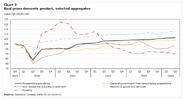- Joined
- 28 May 2020
- Posts
- 6,767
- Reactions
- 13,029
Meanwhile in Canada, their CB has dropped the funds rate by 50BPS.
Perhaps they were spooked by Powell.
Mick
Perhaps they were spooked by Powell.
Mick
Some welcome news for Canadians looking for interest rate relief: Canada’s central bank just announced its fourth rate cut this year, bringing its overnight lending rate down to 3.75% from 4.25%.
The cut of 50 basis points comes after the Bank of Canada (BoC) announced a series of 25 basis points cuts throughout this year. The latest rate cut was in September, when the central bank sliced its lending rate by 25 basis points, bringing it down to 4.25% from 4.50%.
"With inflation now back around the 2% target, Governing Council decided to reduce the policy rate by 50 basis points to support economic growth and keep inflation close to the middle of the 1% to 3% range. If the economy evolves broadly in line with our latest forecast, we expect to reduce the policy rate further," the BoC said in its October 23 announcement.
"However, the timing and pace of further reductions in the policy rate will be guided by incoming information and our assessment of its implications for the inflation outlook."




